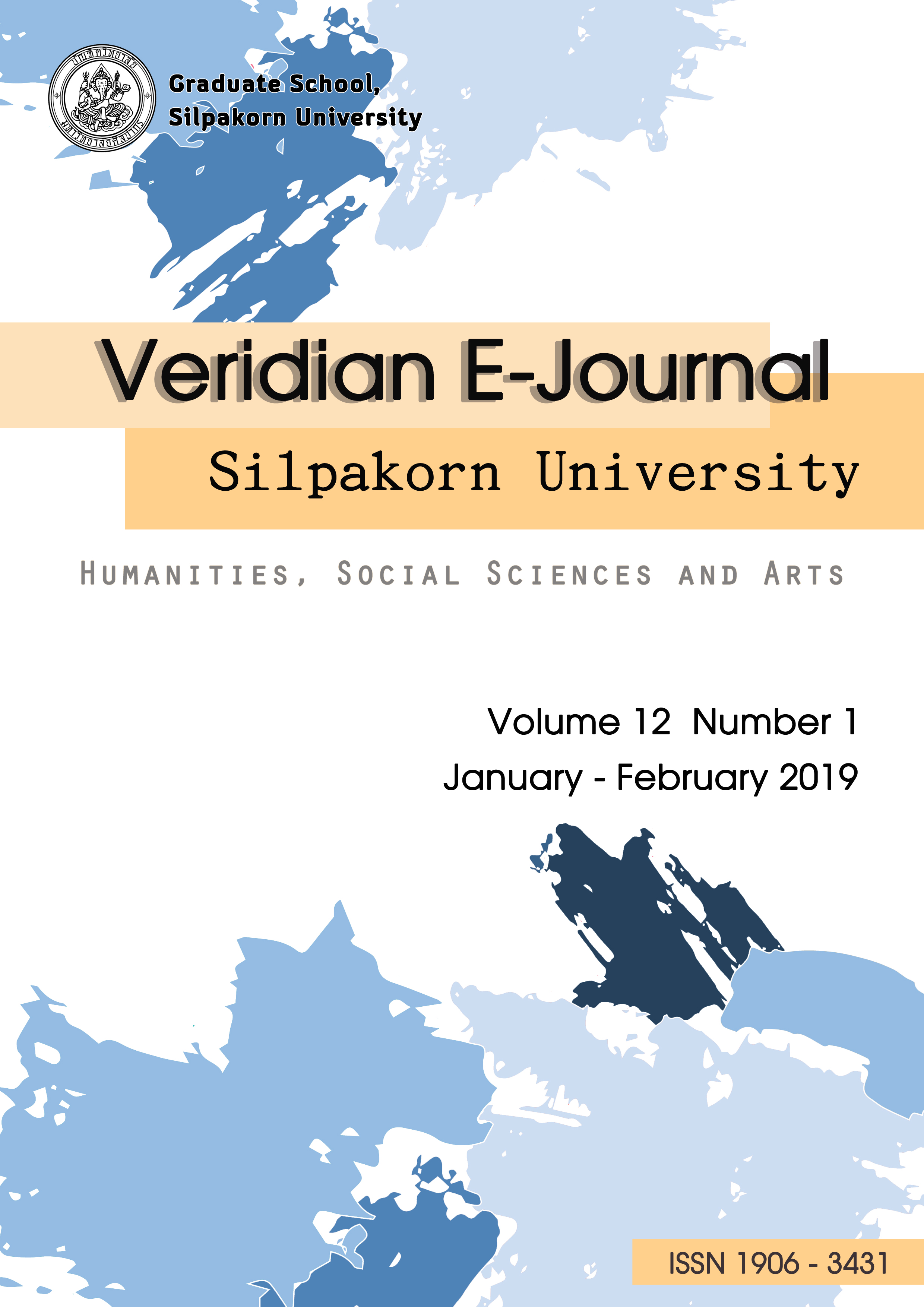การพัฒนารูปแบบกิจกรรมนันทนาการแบบมีส่วนร่วมเพื่อเสริมสร้างความฉลาดทางอารมณ์ของนักเรียนระดับชั้นมัธยมศึกษาตอนต้น (The Development Of Participation Recreation Model For Development Emotional Quotient Enhancementfor Lower Secondary School Students)
Main Article Content
Abstract
การวิจัยครั้งนี้ มีวัตถุประสงค์เพื่อ 1) เพื่อศึกษาข้อมูลพื้นฐานสภาพปัญหาความจำเป็น และแนวทางการพัฒนารูปแบบกิจกรรมนันทนาการฯ 2) เพื่อพัฒนารูปแบบกิจกรรมนันทนาการฯ 3) เพื่อทดลองรูปแบบกิจกรรมนันทนาการฯ และประเมินผลการใช้รูปแบบกิจกรรมฯ โดยใช้ระเบียบวิธีการวิจัยและพัฒนา (Research and development) กลุ่มตัวอย่างที่ใช้ในการวิจัยแบ่งเป็น 2 กลุ่ม คือ กลุ่มผู้มีส่วนร่วมในการจัดกิจกรรมนันทนาการ ร่วมกันวางแผนและออกแบบกิจกรรมโดยการสนทนากลุ่ม โดยใช้วิธีการคัดเลือกแบบเจาะจง (Purposive sampling) ประกอบด้วย ผู้บริหารสถานศึกษาโรงเรียนวัดบางปะกอก ครูระดับชั้นมัธยมศึกษาตอนต้น สภานักเรียน และผู้ปกครอง กลุ่มตัวอย่างที่ใช้ในการทดลองครั้งนี้ ได้แก่ นักเรียนระดับชั้นมัธยมศึกษาตอนต้น ที่ศึกษาภาคเรียนที่ 1 ปีการศึกษา 2561 โรงเรียนวัดบางปะกอก สังกัดสำนักงานเขตราษฎร์บูรณะ กรุงเทพมหานคร จำนวน 40 คน โดยเลือกกลุ่มตัวอย่างแบบเจาะจง (Purposive sampling) ซึ่งได้มาจากการทำแบบประเมินความฉลาดทางอารมณ์สำหรับวัยรุ่นอายุ 12 - 17 ปี ของกรมสุขภาพจิต (2550: 128 - 131)ที่มีคะแนนความฉลาดทางอารมณ์ต่ำกว่า 140 คะแนน ตามเกณฑ์การประเมินความฉลาดทางอารมณ์ ของกรมสุขภาพจิต และสมัครใจเข้าร่วมกิจกรรม
ผลการวิจัยพบว่า : 1. รูปแบบกิจกรรมนันทนาการแบบมีส่วนร่วมเพื่อเสริมสร้างความฉลาดทางอารมณ์ของนักเรียนระดับชั้นมัธยมศึกษาตอนต้น โดยรูปแบบนี้มีองค์ประกอบ 5 ส่วนได้แก่ 1) หลักการ 2) วัตถุประสงค์ 3) ขั้นตอนการดำเนินกิจกรรม 4) ปัจจัยการนำรูปแบบไปใช้ 5) เงื่อนไขในการนำไปใช้ทั้งนี้ มีกิจกรรมจำนวน 40 กิจกรรม ได้ผ่านการตรวจสอบจากผู้เชี่ยวชาญ จำนวน 3 ท่านว่ามีความสอดคล้องเหมาะสมกับกลุ่มเป้าหมาย สามารถนำไปใช้ได้ ใช้ระยะเวลาทดลอง 8 สัปดาห์ โดยการดำเนินการจัดกิจกรรมสัปดาห์ละ 5 กิจกรรม โดยจัดกิจกรรมในชั่วโมงโฮมรูม (Home Room) ในช่วงเช้าทุกวัน
- ผลการทดลองใช้รูปแบบกิจกรรมนันทนาการฯ พบว่า นักเรียนระดับชั้นมัธยมศึกษาตอนต้นมีคะแนนความฉลาดทางอารมณ์หลังจากการเข้าร่วมใช้รูปแบบกิจกรรมนันทนาการฯ มีคะแนนรวมความฉลาดทางอารมณ์อยู่ในเกณฑ์ปกติ (ได้145 คะแนน) ผลการวิเคราะห์ค่าเฉลี่ยของคะแนนความฉลาดทางอารมณ์ของนักเรียนระดับชั้นมัธยมศึกษาตอนต้น ก่อนและหลังการเข้าร่วมใช้รูปแบบกิจกรรมนันทนาการฯ พบว่า นักเรียนระดับชั้นมัธยมศึกษาตอนต้น มีความฉลาดทางอารมณ์โดยรวมหลังการเข้าร่วมกิจกรรม เพิ่มขึ้นกว่าก่อนการเข้าร่วมกิจกรรมอย่างมีนัยสำคัญทางสถิติที่ระดับ .05 3.
- ผลการการประเมินความพึงพอใจของนักเรียนระดับชั้นมัธยมศึกษาตอนต้น กลุ่มทดลองที่มีต่อรูปแบบกิจกรรมนันทนาการพบว่า นักเรียนที่เข้าร่วมใช้รูปแบบกิจกรรมนันทนาการแบบมีส่วนร่วมเพื่อพัฒนาความฉลาดทางอารมณ์ มีความพึงพอใจต่อรูปแบบกิจกรรมนันทนาการ ทั้งโดยรวมและรายข้อ อยู่ในระดับมาก
The purposes of this research: 1) to study basic information, state of necessity. And the development of recreational activities; 2) to develop the recreation activities; 3) to try the recreation activities. And evaluation of the use of the model. Research and Development Methodology. The research sample was divided into 2 groups: participants in recreational activities. Plan and design activities together by group discussion. Use the selection method Purposive sampling. It consists of the administrators of Wat Bangpakok School. Lower secondary school teachers, student councilors and parents. The samples used in this study were junior high school students the first semester of academic year 2561 Wat Bangpakok School. Office of Rat Burana District 40 people Select the sample Purposive sampling. This is derived from the Emotional quotient Assessment for 12 - 17 years old of the Department of Mental Health (2550: 128 - 131) With Emotional quotient scores below 140, Emotional quotient Rating Department of Mental Health and volunteer to participate.
The research findings were follow: 1. Participatory Recreational Model to Enhance Emotional quotient of Lower Secondary School Students This format has 5 components: 1) Principles, 2) Objectives, 3) activities, 4) Implementation factors, 5) Conditions for use. Patterns. 40 activities have been inspected by 3 experts who are consistent with the target group. Can be used the experimental period was 8 weeks, with 5 activities per week. Organize activities in hours home room in the morning every day. 2. The results of the experiment using the recreation activity model showed that lower secondary school students Emotional quotient scores after participation in recreation activities. Total Emotional quotient score (145 points) the results of the analysis of the mean scores of Emotional quotient of junior high school students. Before and after participating in recreation activities, it was found that lower secondary school students have overall Emotional quotient after participating in the activity. There was a significant difference at the .05 level. 3. The results of the evaluation of the satisfaction of the junior high school students Experimental groups on recreation activities were found. Participating students use participatory recreation activities to develop Emotional quotient. Satisfaction with recreation model. Both overall and individual at a high level.

